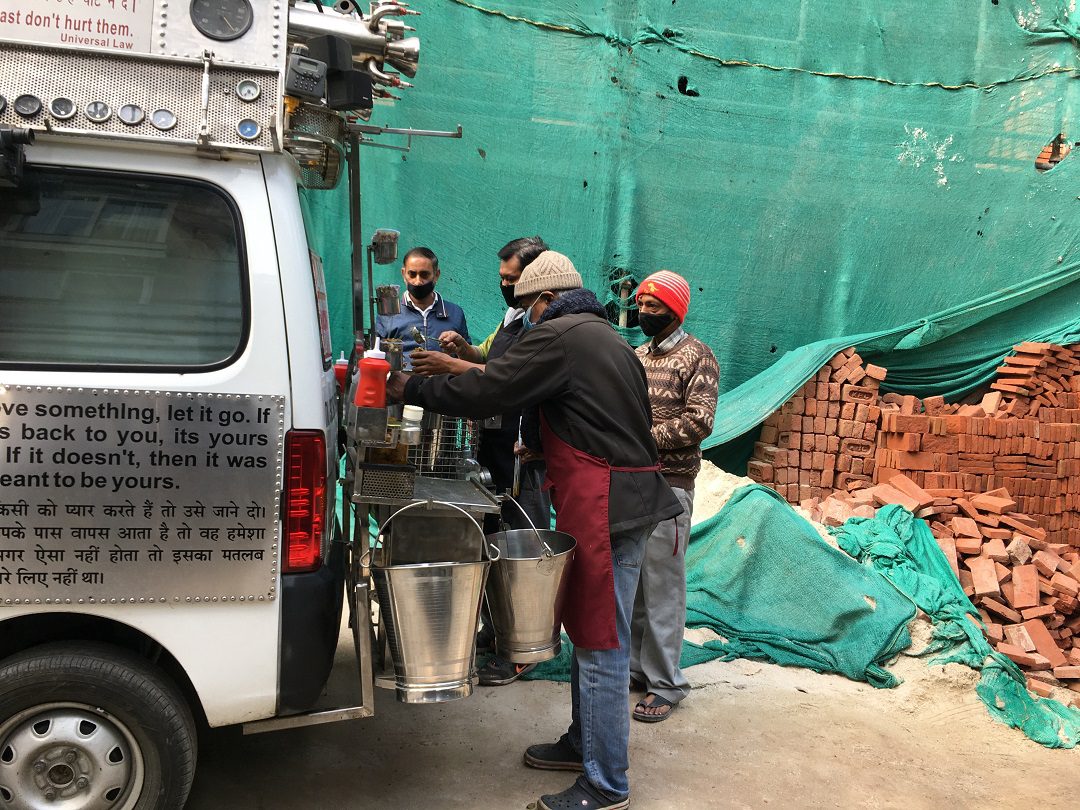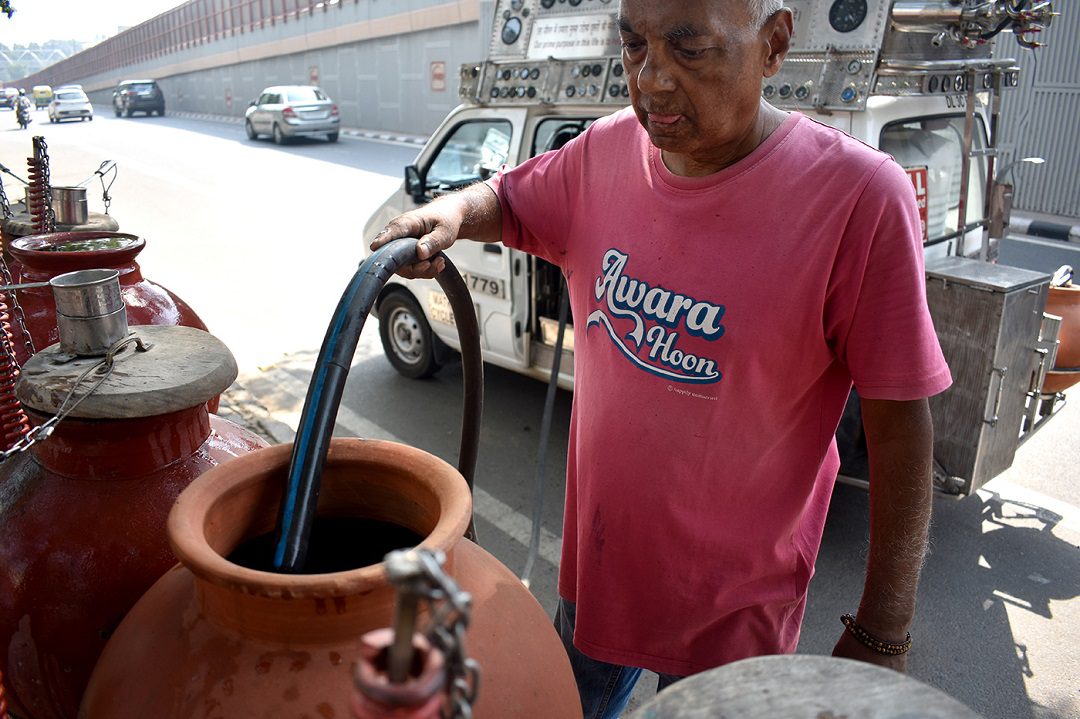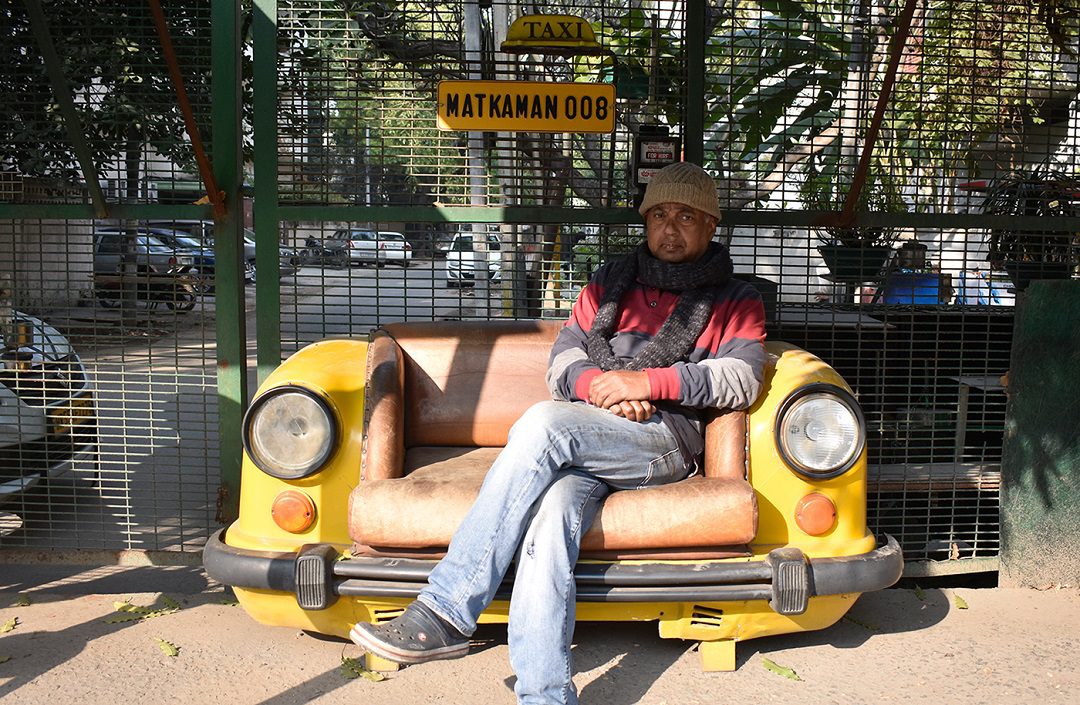(November 26, 2021) “The living are dirtier than the dead,” was Alagarathanam Natarajan’s response to his mother-in-law, who once reprimanded him for not taking a shower after returning from a crematorium. He was then a volunteer in his 60s and was driving a hearse that he would park outside her house every single day. Cut to 2021, the hearse has been replaced with a specially crafted Mahindra Bolero maxi-truck that this engineering drop-out drives around Delhi each day to place potable water across the city to help quench people’s thirst. Meet Alag Natarajan, popularly known as Delhi’s Matka Man, a moniker he earned from his daughter on one of his birthdays.
Not all superheroes wear capes. Some wake up early in the morning to provide clean drinking water to the underprivileged. Each day the London-returned Natarajan drives his truck, which carries 2,000 litres of water, to refill the 70-80 matkas or earthen pots that he has placed around South Delhi. The Panchsheel Park resident decided to dedicate his life to serving others. Being hailed as a “superhero that’s more powerful than the entire Marvel stable” by industrialist Anand Mahindra, Natarajan’s selfless work has grabbed attention in India and abroad. “His tweet was comforting. He is known to bring attention to the stories that matter,” Natarajan tells Global Indian in an exclusive interview.
A Superhero that’s more powerful than the entire Marvel stable. MatkaMan. Apparently he was an entrepreneur in England & a cancer conqueror who returned to India to quietly serve the poor. Thank you Sir, for honouring the Bolero by making it a part of your noble work. 🙏🏽 pic.twitter.com/jXVKo048by
— anand mahindra (@anandmahindra) October 24, 2021
Sri Lanka to India to England
Born in Chillaw in Sri Lanka to a Sri Lankan mother and an Indian father, Natarajan lived in Bengaluru for most of his life before moving to London. An engineering drop-out, Natarajan recalls his days as a “messed up young boy who came from a broken family and was into drugs and alcohol.” To change the trajectory of his life, he boarded a flight to London. “In 1974, I left for the UK on a tourist visa that was sponsored by my sister and didn’t return to India until three decades later. For 10 years, I was an illegal immigrant in England. I was 24 when I boarded that flight to London and like every other young man, I, too, had dreams,” reveals Natarajan.

Matka Man distributing salad at construction sites.
He worked many odd jobs — from being a street hawker to driving long-distance trucks — to stay afloat. “I was quite ambitious and after working hard for a few years, I bought a souvenir shop on Oxford Street. I ended up adding two more shops, including one near Harrods. Things were going perfectly until I was diagnosed with colon cancer in my mid-50s. That’s when life took a turn and after my surgery, I decided to return to India,” reveals Natarajan.
A call for service
Upon his return, he “wandered like an aimless madman” for a while. The battle with cancer had left him emotionally drained; that’s when he began volunteering for a terminal cancer centre in Delhi. “I took over their maintenance completely. Since it was for terminally-ill patients, an ambulance was often required to take their bodies to the crematorium. So I bought a car and converted it into a cremation van and started taking the bodies myself to Sarai Kale Khan Crematorium. It was an abandoned ground with no water or any facilities,” recalls Natarajan.

Matka Man filling water near a bench installed by him.
This pushed him to help quench people’s thirst and he installed his first matka stand outside his home in Panchsheel Park. Guards, house helps and drivers from the locality began to flock to his matka as they braved Delhi’s scorching summer heat. The response spurred Natarajan to install more matkas across the city. “When I curiously inquired with a guard one day, he revealed that his employer didn’t make any arrangements for water for him. He was not allowed to leave his position even for a minute and access to clean drinking water was a luxury for people like him,” reveals Natarajan. Soon, he went about installing several matka stands across South Delhi to ensure that the needy had access to clean drinking water. Most of the stands also feature a cycle pump and bench, should anyone need a rest or a quick fill of air for their cycles. “Everyone needs to relax. I want people to have a space where they can relax for a while. In winters, I distribute blankets,” he says.
“Helping the needy is paramount to me,” says Matka Man. He reveals that though his locality is home to plenty of affluent families, barely anyone steps forward to extend a helping hand to those in need. “People often tell me that I am doing good work but in the last few years, I’ve received not more than ₹10,000 from the residents as donation. I often think, ‘How much more can somebody want?’ It’s greed that’s threatening humanity. I have had my share of living in vanity, now I just want to serve,” says the 72-year-old, who likes to spend time in his garden during his free time.

Matka Man filling up water at one of his matka stands.
For the 2,000 litres of water that goes into filling the 70-80 matkas that are placed across South Delhi, Natarajan was earlier using the borewell water from a nearby school. But now he has access to Delhi Jal Board’s potable water. “When I initially began setting up matka stands across the neighbourhood, many thought it to be a campaign stunt by the Aam Aadmi Party. Gradually they realised that I am neither associated with an NGO nor do I work for the government. They understood that my intention to help the poor is genuine and without any agenda,” he explains.
Man on a mission
Natarajan begins his day at 5.30 am to fill the matkas he’s installed through his maxi-truck that’s fitted with two 1,000 litre water tanks. Though he chose to drop out of his engineering course back in the 1970s, his passion for innovation is evident in his specially modified vehicles. Apart from helping people access potable water, he also spends a few mornings each week distributing a nutritious salad to construction workers and daily wage labourers in the vicinity. He prepares the salad using a variety of legumes such as channa, moong, rajma, sprouts and veggies like potaties, tomatoes and onions. “Construction workers are the most exploited, and I want to help them with a nutritious fix.”
The senior citizen employs only a skeletal staff to keep overhead costs low. “I don’t want to compromise on the quality of food. I am involved in the entire process hands-on. I have installed industrial machines at home which aid us with the peeling and cutting. For me, it’s not about charity, I work like a professional. I visit the sabzi mandis (vegetable markets) to buy fresh produce. I treat them as equals,” adds the Good Samaritan, who worked relentlessly even during the lockdown.

Matka Man’s truck ready for salad distribution.
He uses his savings and investments to fund most of his projects; though there are times when he receives donations from well wishers as well. “During the pandemic, one lady sponsored my entire staff for one year,” he reveals.
Natarajan, who found his biggest cheerleader in his mother-in-law, calls her his biggest support system. “She would often brag about the work I did to others. She never questioned me even when I used to park a cremation van right outside her house every single day,” he reminisces.
It has been 15 years since Natarajan returned to India and has been using every opportunity to work for the needy. “Giving and serving has been an integral part of my life. Pain is a teacher. So after I recovered from cancer, I wanted to help more people. But I was soon disillusioned by the workings of an NGO and decided to do something myself. I started spending my own money to bring about the change that I wanted,” says Natrajan, who is quite inspired by Victor Frankl’s Man’s Search for Meaning.

Matka Man driving his Bolero truck.
At 72, Natarajan is a force to reckon with as he is diligently working for society. “I try to do everything with absolute sincerity. It’s important to be sincere in whatever you do. It’s not about what you do but how sincerely you do it,” signs off Natarajan.
Follow Matka Man on his website


